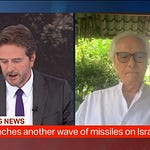Breakfast Special: Iran, Israel and the Global Fallout
Could tensions in the Middle East be easing? U.S. President Donald Trump announced this morning a "total and complete" ceasefire between Iran and Israel. This comes on the heels of a dramatic escalation: Iran attacked a US air base in Qatar after Washington struck 3 key Iranian nuclear facilities, following a wave of Israeli bombardments.
This Breakfast Special unpacks the implications of the crisis. What ripple effects could reach Singapore and the wider region?
Dr. James M. Dorsey, Adjunct Senior Fellow at Nanyang Technological University’s S. Rajaratnam School of International Studies, and Bhavan Jaipragas, Deputy Opinion Editor at The Straits Times, join the Breakfast Show to break it down.
The Center for International Relations and Sustainable Development (CIRSD) hosted an award-winning journalist and scholar Dr. James M. Dorsey for a special Horizons Discussion on June 23rd, 2025. In conversation with Horizons Managing Editor Stefan Antić, Dorsey unpacked the lightning-fast escalation between Israel and Iran, the Trump administration’s divided response, and the wider stakes for regional and great-power politics.
Dorsey opened by framing the October 7th, 2023 Hamas attack as nothing less than “a paradigm shifting event,” the first time Israeli towns were briefly occupied and civilians massacred in their homes. That trauma, he argued, shattered the country’s long-standing reliance on deterrence: “Its defense doctrine today is emasculation,” he said, explaining that Israel now seeks the destruction—not merely the defeat—of adversaries such as Hamas, Hezbollah, and, increasingly, Iran-aligned forces.
After U.S. President Donald Trump abandoned the JCPOA in 2018, Tehran enriched uranium to 60 percent to raise the cost of continued sanctions. The tactic, Dorsey noted, “has boomeranged,” becoming the linchpin in narratives portraying Iran as racing toward a bomb—and thereby justifying Israeli, and now American, strikes.”
When Antić asked what the United States hopes to achieve, Dorsey was blunt: “I don’t know that there’s a policy.… It’s a power struggle within the administration,” he said, recalling how top officials publicly ruled out regime change only for the president to seemingly contradict them hours later. Dorsey likened Trump’s approach to prior negotiations: “Trump’s negotiating strategy is … ‘This is what we’re going to do… and if you don’t do it… then all hell breaks loose.’” Such ultimata, he argued, doomed any realistic chance of reviving a nuclear deal.
Contrary to hopes that a post-Netanyahu Israel might soften its stance, Dorsey cautioned that “There is 82 percent support for the current attacks on Iran,” while virtually no mainstream party questions the Gaza war on humanitarian grounds. Even a new coalition, he suggested, would inherit this hawkish consensus.
Despite boasting a far larger population and battle-hardened ground forces, Tehran faces stark constraints in air, naval, and missile replenishment capacity. “Iran doesn’t have good options,” Dorsey said flatly—yet unconditional surrender would strip the regime of its last shred of legitimacy. Both sides profess willingness to negotiate, but only Washington, not the UN or Gulf mediators, has the leverage to bring Jerusalem to the table.
Dorsey dismissed talk of Beijing or Moscow filling a U.S. vacuum: “Neither China nor Russia is capable, politically or militarily, of replacing the United States in the Gulf.” For all the chatter about a bipolar or tripolar world, the task of keeping the Strait of Hormuz open still falls to Washington—something China actually favors.
Asked to come up with a preliminary assessment of who might be the winners and losers of the latest escalation, Dorsey demurred: “I think time will tell frankly.” Israel may seem victorious on the battlefield, but he warned that the erosion of its international standing “is going to ripple through Israeli society for a significant time to come.” The United States remains a super-power, yet its credibility—already strained by perceived double standards over Gaza—continues to erode.
US strikes on Iran may trigger escalation, not surrender
James M. Dorsey, Adjunct Senior Fellow at Nanyang Technological University, warns that Iran never responds well to ultimatums from the US. He expects Tehran may retaliate but calibrate its response to keep diplomatic doors open.
Iran says US strikes caused minimal damage to nuclear sites
The targeted sites by the US attack on Iran are Fordow, Natanz, and Isfahan. Fordow is one of Iran's key uranium enrichment facilities, located underground in the southwest of Tehran. Natanz is another major enrichment site, which is located southeast of Tehran. Uranium had been enriched to up to 60 per cent purity at the site before Israeli strikes targeted parts of it.












Share this post